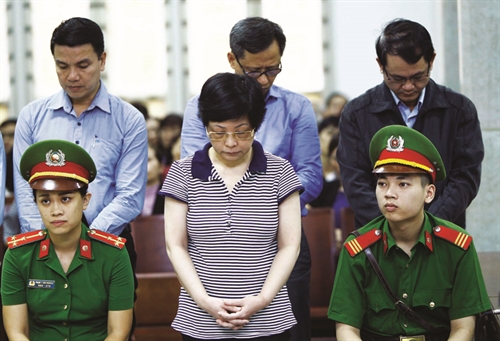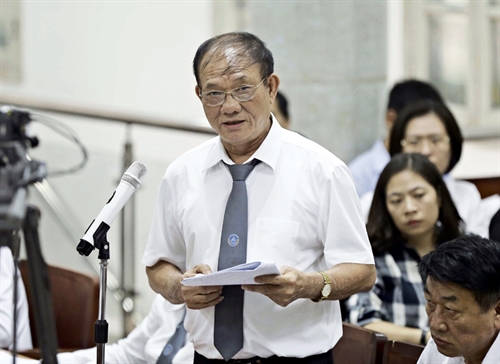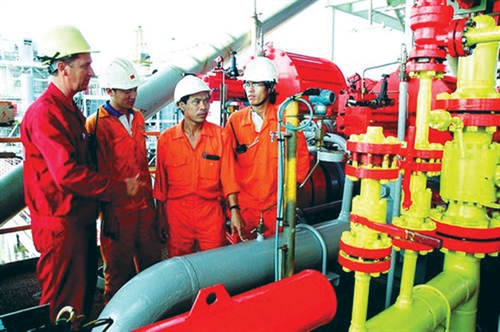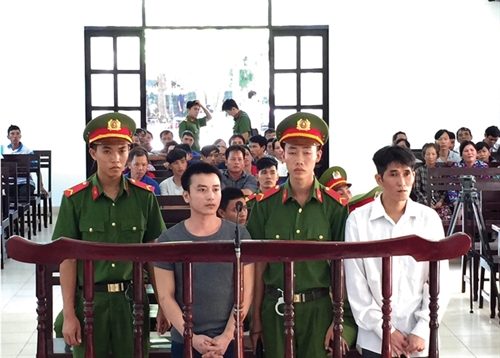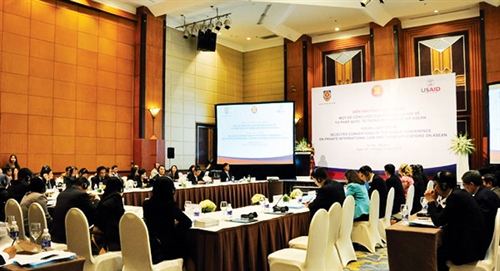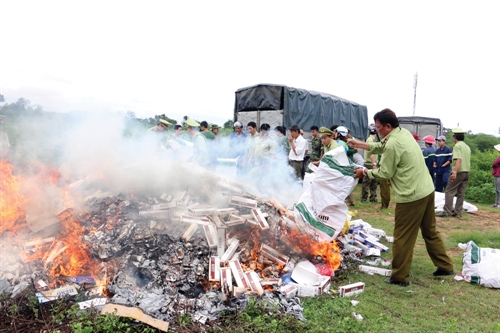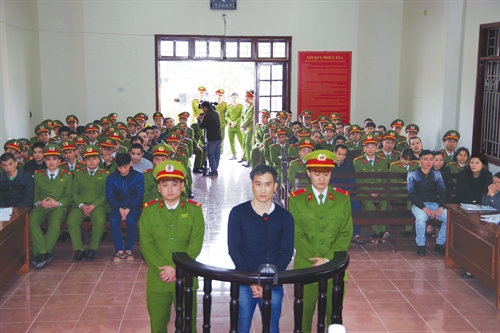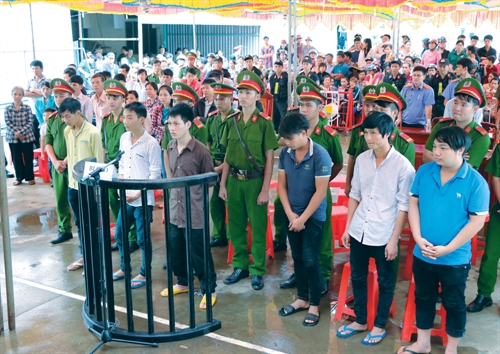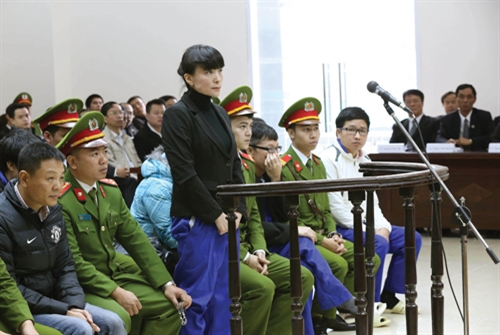Some new laws concerning the fight against crimes in the customs sector will take effect next year. This article introduces the provisions of these laws, highlighting the competence and duties of customs authorities.
Bui Van Thinh
Customs Legal Executive
Legal Department, General Department of Customs
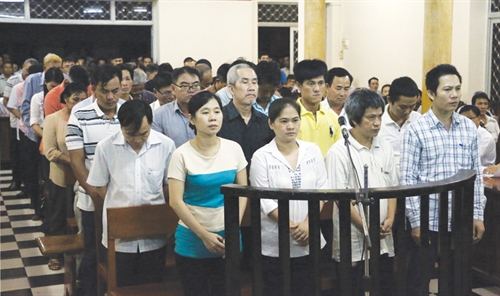 |
| An Giang province’s People’s Court on October 27 pronounces first-instance sentences against 52 defendants of the invoice trading case__Photo: Cong Mao/VNA |
The current laws governing the fight against customs-related crimes include Penal Code No. 100/2015/QH13 (amended by Law No. 12/2017/QH14 of June 20, 2017), Criminal Procedure Code No. 101/2015/QH13, Law No. 99/2015/QH13 on Organization of Criminal Investigation Bodies, and Customs Law No. 54/2014/QH13.
Customs-related crimes, as prescribed in the 2015 Penal Code, include smuggling; illegally transporting goods or currencies across the border; and producing or trading in banned goods.
Under the previous Penal Code (promulgated in 1999 and revised in 2009), customs offices may initiate and investigate criminal cases against only two acts of smuggling and illegally transporting goods and currencies across the border, which are committed by natural persons.
However, as the country’s economy is geared toward global integration with the participation of different economic entities, customs-related violations are committed by not only natural persons but also commercial legal persons in most cases. These violations include not only smuggling and illegally transporting goods or currencies across the border but also trading in goods banned from import or export, evading import or export duty, infringing upon intellectual property rights, violating goods quality and safety standards, violating regulations on management of medicines, medical equipment or quarantine. Geographically, these violations are no longer limited to transportation of goods through the national border but are also detected in the transportation to and from non-tariff zones (industrial parks, export processing zones and border-gate economic zones).
To address the new situation of customs-related crimes, the above-said laws vest customs offices with the power to initiate criminal cases against natural persons and commercial legal persons committing one of the three crimes of smuggling, illegally transporting goods or currencies across the border, or producing or trading in banned goods, and carry out some activities to investigate these crimes (Article 33 of the 2015 Law on Organization of Criminal Investigation Bodies).
Competence of customs offices to investigate customs-related crimes
The 2015 Criminal Procedure Code permits customs offices and competent customs officers to carry out some activities of investigating criminal cases in the field of customs (Article 35). It also defines the tasks, powers and responsibilities of heads, deputy heads and investigators of customs offices assigned to carry out these investigation activities (Article 39).
Under the 2015 Law on Organization of Criminal Investigation Bodies, customs offices that may carry out some investigation activities include the Anti-Smuggling Investigation Department; the Post-Customs Clearance Inspection Department; provincial, inter-provincial and municipal Customs Departments; and Border-Gate Customs Sub-Departments. Upon receiving denunciations or information on crimes or detecting violations which are serious enough for penal liability examination, these customs authorities must verify such denunciations or information and investigate the violations under the 2015 Criminal Procedure Code and Law on Organization of Criminal Investigation Bodies. Specifically, they have to consider and process denunciations or information on crimes or proposals for criminal case initiation, then notify processing results to denouncing, reporting or proposing persons or organizations, and take necessary measures to protect denouncing persons. They must also execute requests or decisions or reply to requests of the procuracy in accordance with the Criminal Procedure Code, and consider and process requests and proposals of responsible agencies, organizations and popularly elected deputies, then notify them of processing results.
When detecting an act of smuggling, illegally transporting goods or currencies across the border or producing or trading in banned goods as prescribed in the 2015 Penal Code, the head of the Anti-Smuggling Investigation Department, the Post-Customs Clearance Inspection Department, a provincial-level or inter-provincial customs department, or a border-gate customs sub-department must carry out the following activities:
- If it is a flagrant delicto less serious crime with obvious evidence and the offender having clear personal identification information, the head may decide to initiate a criminal case, take testimonies, seize and preserve material evidence and documents directly related to the case, search people and places where goods are kept in the customs control area, solicit expert examination when necessary, institute legal proceedings against the accused, and take other investigating measures prescribed in the 2015 Criminal Procedure Code. He must conclude the investigation and transfer the case file to a competent procuracy within one month after issuing the decision to initiate the criminal case.
- If it is a serious, very serious or particularly serious crime or a less serious but complicated crime, the head must decide to initiate a criminal case, take testimonies, seize and preserve material evidence and documents directly related to the case, search people and places where goods are kept in the customs control area, then transfer the case file to a competent investigation body within seven days after issuing the decision to initiate the criminal case.
He may organize and direct investigation activities or appoint a deputy head to investigate criminal cases, inspect investigation activities, decide to replace or cancel groundless and illegal decisions of his deputy, and settle complaints and denunciations under the 2015 Criminal Procedure Code.
When the head is absent, he may authorize his deputy to exercise his powers. Such deputy must take responsibility before the head and law for his assigned tasks. When assigned to investigate a criminal case, a deputy may apply investigating measures allowed by law. The head and deputy heads of the Anti-Smuggling Investigation Department, the Post-Customs Clearance Inspection Department, a provincial-level or inter-provincial customs department, or a border-gate customs sub-department must take responsibility before law for their acts and decisions.
Penalties for customs-related crimes
Under the previous Penal Code, the three customs-related crimes were charged only on natural persons, who may face heavier penalties if committing such a crime in an organized manner. Meanwhile, commercial legal persons committing violations of the customs law and regulations on management of imports and exports would be imposed administrative sanctions only. As per the 2015 Penal Code, any natural or legal person committing a customs-related crime will be criminally punished. In addition to the principal and additional penalties imposed exclusively on natural persons, the Code metes out special penalties against legal persons, including operation suspension or termination, prohibition from doing business or operating in certain areas or from raising capital for a definite time. Natural persons affiliated to criminally charged legal persons will also face penal liability examination.
As specified in Article 188 of the 2015 Penal Code, the smuggling crime can be committed by natural or legal persons. Any natural person who illegally trades across the border or from a non-tariff area into the inland or vice versa in goods, Vietnamese currency, foreign currencies, precious metals or gemstones valued at under VND 100 million but has previously served an administrative sanction for the said act or for an act specified in Article 189, 190, 191, 192, 193, 194, 195, 196 or 200 of the 2015 Penal Code, will be charged with this crime. If the value of the illegally traded goods, Vietnamese currency, foreign currencies, precious metals or gemstones is VND 100 million or higher or the natural person earns an illicit profit of VND 100 million or more from his act, he will also face the same criminal charge. A legal person will be charged with this crime if it illegally trades across the border or from a non-tariff area into the inland or vice versa in goods, currencies or items valued at between VND 200 million and under 300 million or in relics or antiques valued at under VND 200 million. If the value of the illegally traded goods, currencies or items is between VND 100 million and under 200 million but the legal person has previously served an administrative sanction for the said act or for an act specified in Article 189, 190, 191, 192, 193, 194, 195, 196 or 200 of the 2015 Penal Code or has an unexpunged conviction of one of these offenses, it will also face a criminal penalty.
The penalties that a smuggler may face include a fine of between VND 50 million and five billion and imprisonment for six months to 20 years, depending on the severity of his crime. Additionally, he may be banned from holding certain posts or doing certain professions for one year to five years or have his property partly or wholly confiscated.
A smuggling organization may face a fine of between VND 300 million and 15 billion, suspension from operation for six months to three years or shut down, or prohibition from doing business in certain areas or from raising capital for one year to three years.
The crime of illegally transporting goods or currencies across the border, prescribed in Article 189 of the 2015 Penal Code can also be committed by natural or legal persons. Any natural person who illegally transports across the border (a border gate, border crossing, trail, stream or river) or from a non-tariff area into the inland or vice versa in goods, Vietnamese currency, foreign currencies, precious metals, gemstones, relics or antiques will be charged with this crime. A legal person will face criminal punishment if it illegally transports across the border or from a non-tariff area into the inland or vice versa goods, currencies or items valued at between VND 100 million and under 300 million, or relics or antiques. If the value of the illegally transported goods is under VND 100 million but the legal person has served an administrative sanction for the said act or for an act prescribed in Article 188, 190, 191, 192, 193, 194, 195, 196 or 200 of the 2015 Penal Code or has an unexpunged conviction of one of these offenses, it must also be criminally punished.
A natural person committing this crime will face a fine of between VND 20 million and three billion or imprisonment for three months to 10 years, depending on the severity of his crime or value of illegally transported articles. An institutional offender must pay a fine of between VND 200 million and five billion, stop operation for six months to three years or shut down, or will be prohibited from doing business or operating in certain areas or from raising capital for one year to three years, depending on the way of committing the crime (in an organized manner, abusing powers, or dangerous recidivism) and the type of illegally transported articles (relics, antiques or national treasures).
Prescribed in Article 190 of 2015 Penal Code, the crime of producing or trading in banned goods can be also committed by natural or legal persons for the purpose of earning illicit profits. Any natural or legal person that produces or trades in pesticides banned from the State from trading, sale or use, trades in illegally imported cigarettes, produces or trades in firecrackers or other goods banned by the State from trading, sale or use or not yet permitted by the State for sale or use in Vietnam, will be charged with this crime. This crime involves the act of illegally trading in (importing or exporting) banned goods (goods on the lists of goods banned from import or export, those banned from trading, sale or use or those not yet permitted for trading, sale or use in Vietnam) across the national border (land, water or space territory border).
A natural person committing this crime will be fined between VND 100 million and three billion or sent to prison for one year to 15 years, depending on the severity of his crime or value of illegally transported articles. The additional penalties include a fine of between VND 20 million and 100 million and prohibition from holding certain positions or practicing certain professions or from performing certain jobs for between one year and five years.
An institution committing this crime will be imposed a fine of between VND one billion and nine billion, must stop operation for six months to three years or shut down, or will be prohibited from doing business or operating in certain areas or from raising capital for one year to three years, depending on the way of committing the crime (in an organized or a professional manner, abusing the name of another organization, or dangerous recidivism) and the type of illegally produced or traded banned goods.-
